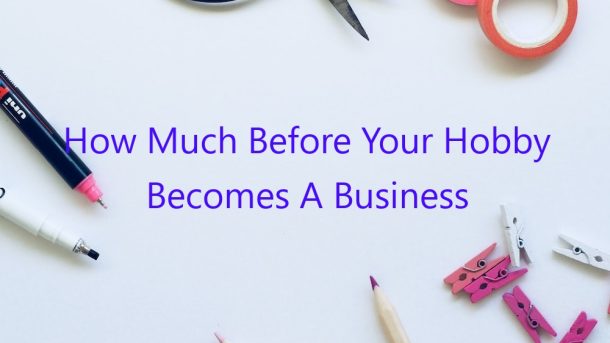When do you cross the line from hobbyist to business owner? For some, it’s a blurry line, while others may feel they’ve already made the jump. The key is to be aware of when your hobby is starting to have a business impact, and to take steps to ensure that you are staying within the bounds of what is legal and ethical.
There are a few factors to consider when determining how much before your hobby becomes a business. The first is the amount of money you are making from your hobby. If you are earning a profit, then you are likely running a business, even if it’s a small one. The second is the amount of time you are spending on your hobby. If you are devoting more and more of your time to your hobby and less time to other activities, then you are likely moving towards a business model.
The third factor to consider is the amount of organization and planning you are doing around your hobby. If you are starting to treat your hobby like a business, with processes and procedures in place, then you are likely moving in that direction. And finally, the amount of risk you are taking with your hobby is also a consideration. If you are investing money in your hobby or taking other risks, then you are likely moving towards a business model.
So how do you stay within the bounds of a hobby when your hobby is starting to have a business impact? The key is to keep things small and simple. Don’t start investing too much money in your hobby, and don’t take on too many risks. Keep your processes and procedures simple, and don’t spend too much time on your hobby. And most importantly, remember that it is a hobby, and don’t treat it as a business.
If you are starting to feel like your hobby is becoming a business, it’s important to take steps to protect yourself. Make sure you are aware of the legal and ethical implications of running a business, and consult with an attorney or accountant if you have any questions. And most importantly, keep things simple and remember that it is a hobby.
Contents
At what point does a hobby become a business?
There is no definitive answer to this question as it can depend on a variety of factors. However, there are a few key points that can help you determine when a hobby has become a business.
The first consideration is whether you are making a profit from your hobby. If you are generating income from your activities, then it is likely that you have turned your hobby into a business. Additionally, if you are spending a significant amount of time and money on your hobby, this may also indicate that it has become a business.
Ultimately, it is up to you to decide when your hobby has become a business. If you are enjoying the activities and making a profit, then there is no reason to stop. However, if you are feeling overwhelmed or stressed out by your hobby, then it may be time to re-evaluate and decide if it has become a business.
Do I need to report my hobby as a business?
Do I need to report my hobby as a business?
Whether or not you need to report your hobby as a business depends on a few factors. Generally, if your hobby is generating income, you will need to report it as a business. However, if your hobby is just for fun and you’re not making any money from it, you don’t need to report it.
There are a few things you need to keep in mind when it comes to reporting your hobby as a business. First, you need to make sure you’re following all the necessary rules and regulations for your state and local government. You may also need to register your business with the IRS and get a tax ID number.
Additionally, you need to make sure you’re keeping track of all your income and expenses related to your hobby. This includes money you earn from selling products or services related to your hobby, as well as money you spend on supplies, materials, and other associated costs.
By keeping track of all this information, you can ensure that you’re reporting all of your income and expenses correctly. This can help you avoid any penalties or fines from the IRS.
Overall, whether or not you need to report your hobby as a business depends on a few factors. If you’re following all the necessary rules and regulations, and you’re keeping track of your income and expenses, then you should be good to go.
How do I know if my hobby is a business?
Many people have hobbies that they enjoy, but is it possible that your hobby could be a business? It’s not always easy to tell the difference, but there are a few things you can look for to help you decide.
The first thing to consider is whether you are making money from your hobby. If you are, then it’s likely that you’re operating a business, even if you don’t realise it. If you’re not making money, but you’d like to, then that’s another sign that you’re running a business.
Another thing to consider is how much time you’re spending on your hobby. If you’re spending most of your time on your hobby, then it’s likely that you’re running a business. If you’re only spending a small amount of time on your hobby, then it’s probably just a pastime.
Finally, think about the risks and rewards of your hobby. If the risks are high and the rewards are low, then it’s likely that you’re just enjoying a hobby. If the risks are low and the rewards are high, then it’s more likely that you’re running a business.
So, how do you know if your hobby is a business? The best way to find out is to ask yourself these questions. If the answer to most of them is ‘yes’, then you’re probably running a business without realising it.
Can I earn money from a hobby without paying tax?
Yes, you can earn money from a hobby without paying tax, as long as the income you earn is not considered to be a significant source of income. If you earn more than £1,000 from your hobby in a tax year, you will need to declare that income to HMRC and may be liable to pay tax on it. However, if your hobby income falls below this threshold, you don’t need to do anything and can keep the money you earn from it tax-free.
Do I need to report income from a hobby?
Do you need to report income from a hobby?
The answer to this question depends on a few factors, including how the income is earned and what type of hobby it is. In general, if you earn income from a hobby, you are required to report that income on your tax return.
There are a few exceptions, however. For example, if you earn income from a hobby that is not your main source of income, you may not need to report that income on your tax return. Additionally, if you sell items you made from your hobby, you may be able to claim a tax deduction for the expenses you incurred while pursuing the hobby.
To determine if you need to report income from a hobby, you will need to familiarize yourself with the specific tax rules that apply to your situation. For more information, consult a tax professional.
Do I pay taxes on hobby income?
Do I pay taxes on hobby income?
This is a question that a lot of people have, and the answer can be a bit confusing. The short answer is that you might have to pay taxes on your hobby income, but it really depends on the situation.
In general, you have to pay taxes on income that you earn from activities that are considered to be a business. If you are doing something as a hobby and you are not earning any money from it, then you don’t have to worry about paying taxes on that income.
However, if you are earning money from your hobby, then you might have to pay taxes on it. The amount of taxes that you have to pay will depend on how much money you earn from your hobby.
There are a few things to keep in mind if you are thinking about earning money from your hobby. First, you need to make sure that you are actually earning a profit from your hobby. In other words, your expenses need to be less than your income.
Second, you need to make sure that you are declaring your hobby income on your taxes. If you don’t declare it, you could end up getting in trouble with the IRS.
Overall, it is important to understand the tax implications of earning money from your hobby. If you are not sure whether or not you have to pay taxes on your hobby income, it is best to talk to a tax professional.
What is the hobby loss rule?
The hobby loss rule is a taxation principle that allows taxpayers to deduct hobby expenses up to the amount of hobby income. The rule applies to individuals, partnerships, and corporations.
The hobby loss rule is based on the principle that taxpayers should not be taxed on income that is not related to their main line of work. For individuals, the main line of work is usually their job. For partnerships and corporations, the main line of work is usually the business that they are in.
Hobby expenses are those expenses that are incurred in order to generate the hobby income. They include things like the cost of supplies, equipment, and transportation.
The hobby loss rule does not apply to expenses that are related to the taxpayer’s main line of work. For example, an individual who is a doctor cannot claim the expenses for his or her hobby of writing a novel as a deduction against income from the doctoring business.
There are a few things to keep in mind when claiming a deduction for hobby expenses. First, the expenses must be reasonable in relation to the income generated from the hobby. Second, the expenses must be incurred in order to generate the hobby income. Finally, the hobby income and expenses must be reported on Schedule A of the tax return.




